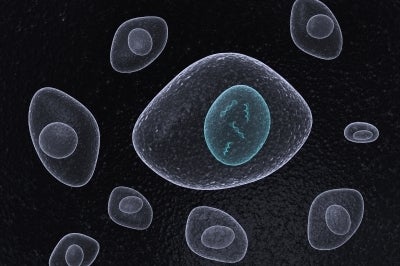A new drug can take between 11 and 14 years to bring to market, according to the Washington, D.C.-based Independent Institute – and that’s assuming the pharmaceutical companies that develop the drug can even make it that far.
Natick-based start-up Karyopharm Therapeutics Inc. seems to be well on its way.
The start-up company, which was founded by Dr. Sharon Sacham in 2009 and has raised $30 million in Series A financing, entered its first human trials this month to test its oral cancer drug, called KPT-330.
Trial Hopes
The drug, which takes advantage of the body’s own cellular defense mechanisms that, when working correctly, trigger damaged cells to die off, has shown promising results in mice, rats, dogs and monkeys, said Dr. Michael Kaufmann, Karyopharm’s CEO.
Kaufmann said the company is excited and hopeful about trying to help humans suffering from cancer.
The point of the two Phase I trials is to determine the safety and side effects of the drugs. And the biggest hope, Kaufmann said, is that doctors see a slowing or stopping of the growth of cancerous tumors in patients enrolled in the trials.
One trial is for patients with blood-born cancers or lymphomas and the other is for patients with advanced solid tumors. All of the patients have developed a resistance to other cancer drugs after previous treatments.
How It Works
The human body has built-in defense mechanisms that trigger damaged cells which are beyond repair to “commit suicide,” Kaufmann explained. Without these tumor-suppressing proteins, every sunburn would cause cancer, he said.
Of course, cancer still happens to many people, but it is the result of a failure of the proteins to audit the cells for damage. Some cancers have developed the ability to export the proteins from the nucleus of the cell, where they cannot do their defensive duties.
Karyopharm’s KPT-330 targets the way in which the cell moves those proteins. There are seven pathways a cell can use to export those proteins. But luckily, no matter the type of cancer, the same “chaperone” protein is used to carry the tumor-suppressing proteins from the cell. It’s called CRM-1.
“Our drug blocks the chaperone,” Kaufmann said. “It actually causes the cell to bring back its own auditors.”
Once those auditors are brought back, they can do their job and tell a damaged cell to die, effectively killing the cancer.
It will be a long road ahead. All phases of clinical trials can take six to 11 years, according to the Independent Institute.
But stay tuned, because it’s full speed ahead for Karyopharm.
Image credit: freedigitalphotos.net
Read more

